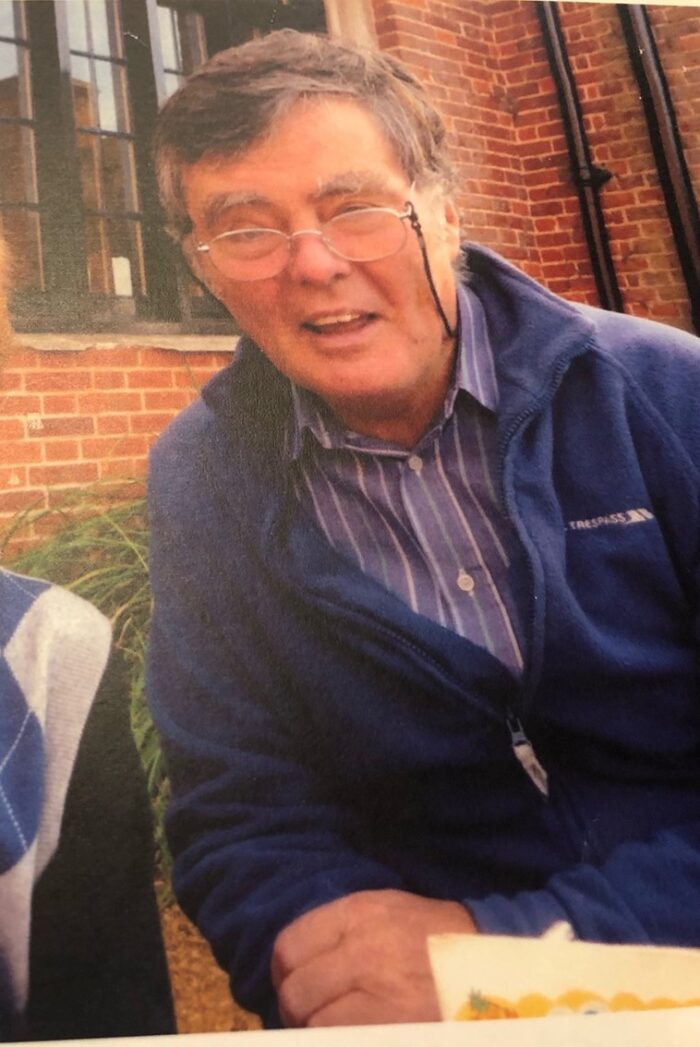Dr Alan Findlay
Subject studied
Neuro-endocrinology
Year of birth
1939
Year of death
2023,
With thanks to Alan’s friend and colleague, Mary Kendall for writing this obituary.

Alan Findlay was born in Liverpool in 1939. His father, mother and one of his two brothers were doctors. Notwithstanding an interest in medicine Alan suffered from severe over-exposure to the profession during his childhood and decided to study to become a vet instead.
Alan arrived at Christ’s College, Cambridge in 1958 where he grew to love Physiology. He did qualify as a vet but practised for only a few weeks before starting his PhD on lactation. This was followed by post-doctoral research in Los Angeles 1967-68.
He returned to a job in the Cambridge Anatomy Department before moving to the Department of Physiology where he became Secretary to the Faculty Board. In 1970 he became acting Director of Studies for Medicine in Churchill College, standing in for Grahame Cooper who was on sabbatical. Grahame never returned to Churchill and Alan became a Teaching Fellow in 1972, in which post he remained until 2005, being in later years Director of Studies for Veterinary Science as well as Medicine. Alan published his book Reproduction and the fetus in1984. This became a standard text for medics, and it has always been a huge pity that he never found time to write a second edition.
During his time at Churchill Alan’s involvement and influence was immense, broken only by a sabbatical year at the University of Pennsylvania in 1978/79, where he worked on salt appetite, and another sabbatical in Melbourne during the 1990s. On his return from Melbourne he served as Head of the Department of Physiology for one year, then Chairman of the newly-united Faculty Board of Biology for five years. All this in addition to his College responsibilities: he was an Undergraduate Tutor from 1979-1987, Tutor for Advanced Students from 1988-96 and Senior Tutor from 2000 until his retirement in 2007. Whether teaching or tutoring Alan was tireless in giving encouragement to his students and in looking after the welfare of those in his care. He continued his teaching briefly after retirement, giving a course on Understanding the brain for the U3A in 2012.
Alan had two four-year stints on the University Council, where his dogged perseverance in the cause of transparency in accounting within Cambridge University Press led to CUP providing all College libraries with a healthy annual sum for the provision of CUP books, a practice which continues to this day.
Alan’s interest in libraries was long-standing. He was Fellow Librarian in Churchill College from 1976-1986, but far from providing aloof, academic oversight he was hands-on, involved, always available and brimming with ideas. His outstanding achievement was the automation of the College Library. With no prior computer or programming experience Alan taught himself how to program in dBASE and, beginning with the transfer of all library card catalogue records to electronic machine-readable format, he developed a full-blown automated library system which became the envy of other Cambridge colleges. It was widely adopted and, at its height, was running 10 libraries round town, becoming the foundation on which future library automation systems could be built as technology advanced. Subsequently he helped the Archives Centre to adapt the National Library of Scotland’s cataloguing software to Churchillian requirements.
Alan’s involvement with University and College life was by no means limited to academic and administrative activities. His love of music making, which began in his schooldays, is well-known. He had a wonderful singing voice and was a member of the Cambridge University Music Society (CUMS) from his very advent in Cambridge. His contribution to the musical life of the College is legendary. It was Alan who in 1980 inaugurated the Music Sizarship, whereby a student receives an allowance for fostering the musical life of the College, and it was Alan who in 2007 created the senior post of Director of Music Making, both positions flourishing to this day. It was Alan who was chiefly responsible for the gift of the Yamaha Grand piano in 1981 and the acquisition of the David Rubio harpsichord in 1983, and it was Alan who played such a key part in the planning and design of the new purpose-built Music Rooms. Alan also loved organizing informal music evenings for the Fellows, memorable among which was the Olde Tyme Variety Hall with Alan in fine voice – who can forget his rendering of “Come into the garden, Maud”? Foremost among the music memories of senior members of the College must surely be the traditional carols at the Fellows’ Christmas Dinner in the dining hall. Here, before dessert was served, the lights were dimmed and Alan would lead a procession of singers bearing candles and carol books, penetrating the darkness with their heraldic voices before processing out of the hall and leaving the diners feeling that Christmas had now truly arrived.
Alan was a competent sailor and keen rower. For a number of years during the summer months he crewed on sailing trips with Fellow Churchillians. He rowed in the Churchill College Fellows’ Eight and was regularly seen out on the river with the Free Press (now X-Press) Boat Club.
Alan was a genial companion at dinners. He had interesting things to say on all subjects and was a good listener. He was always ready to discuss matters rationally and to give advice and help where it was sought. Even if he didn’t agree with you, he would always take on board your point of view. He was devoted to the College, a man who understood the meaning of ‘Fellowship’ in all senses.
Alan is survived by his wife, Judith, whom he married in 1966, and his two sons, Matthew and Tom.
Alan Leonard Ross Findlay was born on 13 December 1939 and died on 31 October 2023 following a long illness, patiently borne.
